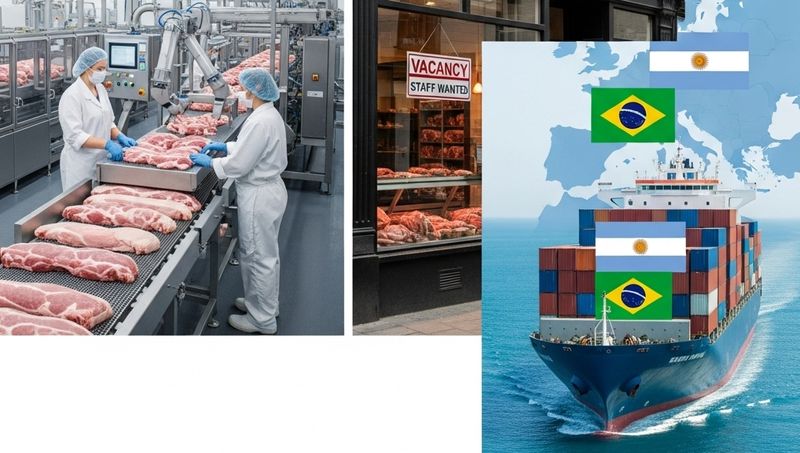
Market Pulse: Cranswick's Export Success, UK Labour Woes, and Mercosur Deal's Impact
Strong export growth boosts Cranswick's revenues, but new UK visa rules threaten the wider sector's labour supply, while the EU's Mercosur deal looms over the beef market.
Corporate Strategy: Cranswick Revenues Up on Strong Export Performance
What happened: UK food producer Cranswick PLC has reported a strong start to its financial year, with revenue up 9.7% for the 13 weeks to June 28th. A key driver was a significant increase in export revenue, which benefitted from higher volumes and pricing after its Norfolk-based fresh pork facility had its China export licence reinstated. The company's poultry and pet food divisions also performed well, and Cranswick has committed to a further £14 million investment to expand its pet food facility in Lincoln.
Why it matters: Cranswick's success demonstrates the immense value of access to international markets like China. It highlights how a single site's certification can have a material impact on a company's top line. The continued investment in pet food also signals a key growth area for utilising the full carcase and maximising value.
Implications & suggested actions:
Processors: This is a clear signal of the importance of securing and maintaining export certifications for key markets. For those with by-products suitable for the pet food industry, Cranswick’s investment underscores the growing value of this sector.
Farmers & Suppliers: A thriving Cranswick is good for its supply chain. Strong performance and continued investment signal stable, long-term demand for pigs and poultry.
Wholesalers: Be aware of the strong demand from the pet food sector for certain materials, as this could influence availability and pricing for products destined for human consumption or other channels.
UK Regulation: Industry Warns of Labour Crisis from New Visa Rules
What happened: The British meat industry is raising the alarm over recent changes to the UK's Skilled Worker visa scheme. New rules, which came into force in late July, raise the skills threshold to a graduate-level equivalent and increase minimum salary requirements to £41,700. Industry bodies like the British Meat Processors Association (BMPA) and the National Pig Association (NPA) warn this will effectively cut off a vital route for recruiting overseas butchers, farm managers, and other essential staff.
Why it matters: After the post-Brexit labour crisis of 2021-22, the visa route, though expensive, provided a critical lifeline for many businesses. Closing this off without a ready supply of domestic labour risks a repeat of production bottlenecks, falling output, and ultimately, threatens food security. The industry argues that local recruitment efforts have consistently failed to fill these roles, even at competitive wages.
Implications & suggested actions:
Farmers & Processors: This is an urgent threat to your operational capacity. The long-term solution is investing in domestic training, but that will not solve short-term needs. Engage directly with the NPA and BMPA to support their lobbying efforts for a pragmatic government rethink.
Wholesalers: Labour shortages in processing plants directly impact you through reduced throughput and potential order delays. Factor this risk into your planning and maintain open lines of communication with your suppliers.
Retailers: The entire supply chain is at risk. A shortage of skilled butchers and farm staff will inevitably lead to higher costs and could impact the availability of British meat on shelves. Supporting industry-wide recruitment and training initiatives is in your long-term interest.
International Trade: EU-Mercosur Deal & South American Beef Imports
What happened: The EU’s latest agricultural outlook forecasts that beef imports into the bloc could increase by up to 5% this year, driven by increased shipments from Mercosur countries like Brazil and Argentina. This comes as the long-negotiated EU-Mercosur trade agreement continues to be a major point of contention. The deal would grant a tariff rate quota (TRQ) of 99,000 tonnes for Mercosur beef at a much-reduced tariff of 7.5%, significantly increasing competition for EU producers.
Why it matters: European beef farmers, who already face high production and environmental standards, are concerned that a wave of cheaper South American imports will undercut the domestic market. While the EU maintains that all imports must meet its stringent food safety standards, critics argue the deal creates a "double standard" on environmental and animal welfare practices. The increased import forecast, even without the deal being ratified, shows the growing pressure from South American supply.
Implications & suggested actions:
EU Farmers: The threat of increased, lower-cost competition is very real. This reinforces the need to focus on points of difference, such as provenance, quality assurance schemes, and high welfare standards, to justify a premium to consumers.
Processors: This could create a two-tiered market for raw materials. While access to cheaper imported beef might benefit some manufacturers of processed goods, those focused on fresh, domestically-sourced products will need to emphasize their sourcing credentials more than ever.
Wholesalers & Retailers: Be prepared for a more complex sourcing landscape. While Mercosur beef may offer a lower price point, consumer interest in sustainability and origin remains high. Clear labelling and communication about your sourcing policies will be crucial to maintaining consumer trust.
Sources
Cranswick hails strong revenue growth from exports and premium ranges - Shares Magazine (28 July 2025)
Cranswick PLC (CWK.L): A Steady Performer In The Packaged Foods Industry With Promising Upside - DirectorsTalk Interviews (6 August 2025)
British meat industry concerned about reduced access to skilled workers - Farmers Guide (8 August 2025)
EU short term outlook predicts red meat production declines - AHDB (8 August 2025)
Just the Facts | What is the EU-Mercosur Trade Agreement? - European Movement Ireland (28 March 2025)
